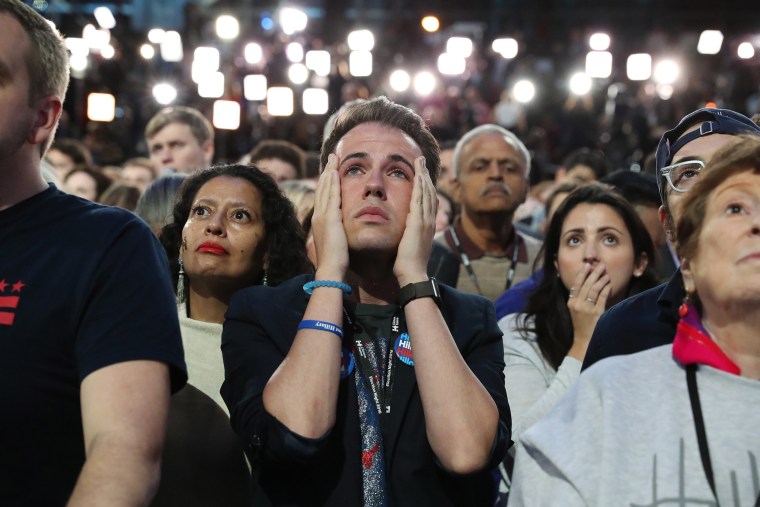NEW YORK — The Democratic Party was decapitated overnight.
Hillary Clinton's stunning loss to Donald Trump created a power vacuum at the top of the party and a crisis of confidence among its remaining standard bearers.
Clinton was nowhere to be seen at her election night party early, held in a convention center in Manhattan whose glass ceiling was supposed to represent the metaphorical one she seemed so close to shattering just hours earlier. But the ceiling went unbroken and she conceded privately to Trump.
Instead, the unenviable task of addressing Clinton’s crestfallen supporters fell to John Podesta, Clinton’s campaign chairman, who is better known as a behind-the-scenes operator than a public leader.
“I know you've been here a long time. It's been a long night and a long campaign. But I can say, we can wait a little longer can't we?” Podesta said early Wednesday. "Several states are too close to call, so we are not going to have any more to say tonight."
Clinton is due to make a statement Wednesday morning.
Clinton aides and supporters in the campaign's final months believed they were fighting a noble battle to defend the ramparts of the republic from the existential threat posed by Trump. They were confident that they would not just defeat the GOP nominee, but also repudiate him and everything he stands for with an overwhelming margin.
“Bernie supporters warned the party — and they would not listen.”
And yet despite having virtually every possible advantage at her disposal, from more money to better staffers to better data, it was Clinton and her party that was repudiated in the biggest presidential shock in recent memory.
Her staff went dark as the night wore on and their prospects dimmed. Her surrogates disappeared from sight.
What precisely went wrong may take weeks or months to sort out. Most likely, it wasn’t any one thing — it was everything. Defeat, in this case, has a thousand mothers.
The magnitude of the upset, and its consequences for the party and country seem hard to overstate.
The Republican Party was the one thought to be facing a post-election civil war, but now it will likely be the Democratic one.
Whether it rips the party apart or causes it to come together as a united opposition to Trump will depend on how key actors react to the news none of them anticipated.
Eyes will turn to Bernie Sanders and Elizabeth Warren, leaders of a progressive wing of the Democrats that may feel emboldened by Trump's win. And they will turn to President Barack Obama, the main uniting figure in the party, whose entire legacy is now on the line.
There will be plenty of blame to go around, starting with Hillary Clinton herself.
Clinton and her centrist brand, already tainted even before the email scandal broke in March 2015, the month before she launched her bid, was an imperfect fit for a party that had become dramatically more liberal and less white than it was when her husband was president.
She struggled to generate enthusiasm from the start and never managed to change her record high unfavorability ratings and low trust ratings.
Whether it was her gender, her 30 years at the center of the political establishment, the instinct for secrecy that led to her using a private email server, or some combination of the above, too many Americans simply did not like her.
And for all its sophistication, Clinton’s widely hailed data-driven campaign, modeled on the successful Obama 2008 and 2012 turnout efforts, missed the mark.
Then there are key components of the Democratic coalition: Millennials, who stayed home or voted for third-party candidates, and black voters, who turned out in lower numbers than they did for Obama.

There is blame for the independent candidates Jill Stein and Gary Johnson, both of whom made it clear that Trump was unacceptable, but soldiered on. Their margins could easily have carried Clinton over the top in key states.
Clinton allies will justifiably point to a sequence of an unprecedented external interference. From one-sided Russian hacking and disclosure of their findings on WikiLeaks to FBI Director James Comey’s last-minute intervention on emails.
They will blame the media, which gave Trump so much coverage throughout the campaign and chased Clinton’s email scandal with what Democrats saw as clear double standard.
And they will blame Republican voter suppression efforts in North Carolina — proven to be coordinated by state party officials — a state that could have tipped the race had its narrow margin been reversed.
Fingers were being pointed before the race had even been called.
“Bernie supporters warned the party — and they would not listen. Win or lose, the party elite blew this,” Jonathan Tasini, a former Bernie Sanders surrogate emailed reporters.
Meanwhile, Clinton loyalists may argue that some of Clinton’s biggest upsets came in states Sanders won in the primary — Michigan, Wisconsin, and New Hampshire — and that he continued to gin up antipathy toward the nominee and the entire system after it was clear he had no chance of winning.
But then there’s the Democratic Party itself, from Obama on down, which cleared the field for Clinton and lined up nearly unanimously behind her in her primary against Sanders.
The progressive project now seems endangered, with Trump likely to have few checks on power from a Republican-controlled Congress and conservative leaning Supreme Court.
And the foundation on which to rebuild the party is weak, with a structural disadvantage in down-ballot races and depleted bench of future leaders.
Stunned and horrified by their loss, Democrats will likely waste little time preparing to fight Trump in the 2018 midterm elections and eventually the 2020 presidential election.
But first they will have to decide what kind of party they want to be, without a leader to unite behind.
